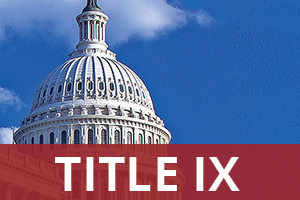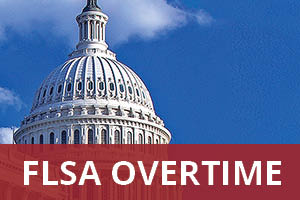by CUPA-HR | August 14, 2024
Each month, CUPA-HR General Counsel Ira Shepard provides an overview of several labor and employment law cases and regulatory actions with implications for the higher ed workplace. Here’s the latest from Ira.
Student-Athletes and NCAA Propose a $2.8 Billion Settlement in Antitrust and Name, Image and Likeness Case
Attorneys representing student-athletes have filed for court approval of a $2.8 billion settlement reached with the NCAA and the Power Five conferences. Bloomberg reports that the student-athletes were pursuing a $4.5 billion claim.
Under the proposed settlement, a men’s football or basketball player would receive roughly $135,000 and a female basketball player would receive roughly $35,000. Athletes in other Division I sports, including football and basketball players in non-Power Five conferences, would also recover under the proposed settlement, although the terms of that recovery are not yet clear.
Also under the proposed settlement, Division I schools will be able to provide student-athletes with direct payment up to a cap of 22% of the Power Five schools’ average athletic revenue per year. The payment pool will be more than $20 million per school in the 2025-26 academic year and will grow from there. The Power Five includes the Big Ten, Big 12, Atlantic Coast Conference, Southeastern Conference and Pac-12. (The Pac-12 lost its autonomy status for 2024-25 after 10 of 12 of its members departed for other conferences.) The proposed settlement was filed in the U.S. District Court for the Northern District of California (In Re College Athlete NIL Litigation (N.D. Cal., 4:20-cv-03919, 7/26/24)).
It is reported that the multibillion-dollar settlement would be paid out over 10 years. A preliminary approval hearing will take place in September to be followed by a comment period from class members. If approval is reached it will spare the NCAA and the Power Five from a trial scheduled to take place in January, 2025.
Employee Status of Student-Athletes Under the FLSA Still Undecided as Court Rejects NCAA’s Appeal
The 3rd U.S. Circuit Court of Appeals (covering Delaware, New Jersey, Pennsylvania and the Virgin Islands) rejected the appeal of the NCAA contesting the trial court decision that college athletes are entitled to a trial to decide whether they are employees under the FLSA.
The appeals court remanded the case back to the trial judge for more analysis on the applicable standard to be used in determining whether a student-athlete is an employee. The decision allows the college athletes to continue to pursue their claims, which allege that the NCAA and colleges are joint employers (Johnson V. NCAA (3rd Cir. No. 22-01223, 7/11/24)).
The decision contrasts with the former holdings of the 7th U.S. Circuit Court of Appeals and the 9th Circuit, which rejected claims that student-athletes were employees. In remanding the case back for further analysis, the 3rd Circuit left room for the court to hold that some college athletes maintain their amateur, non-employee status while others are employees subject to the minimum wage requirements of the FLSA.
The decision also rejected the term “student-athlete,” commenting that the term is an “NCAA marketing invention” designed to “conjure up the nobility of amateurism,” assert “the precedence of scholarship over athletics,” and “obfuscate the nature of the legal relationship at the heart of a growing commercial enterprise.” The decision stated that college athletes “cannot be barred as a matter of law from asserting FLSA claims simply by virtue of the revered tradition of amateurism.” Finally, the court remanded the case to the trial judge to use common-law factors, such as level of control and presence of payments, to determine the employee status of college athletes.
Unionization Petitions Filed With NLRB Increase by 30% in 2024 — Decertification Petitions Increase by 12%
Petitions filed with the National Labor Relations Board (NLRB) to both certify and decertify union representation are up dramatically so far this year.
The increase in certification petitions is partially attributed to the NLRB’s decision in the Cemex decision. That decision requires employers, in response to a certification petition, to either voluntarily recognize the union or file an RM, which is used by employers to dispute that the union has majority status. The increase in activity also comes after the NLRB altered its administrative procedures to shorten the time between petition filing and the election.
The NLRB also reports that its regional offices have conducted more representation elections so far in 2024 than in the entire 2023 fiscal year. Finally, the NLRB reports that unions have won 79% of union-filed petitions and 70% of employer-filed petitions.
EEOC Signals Second Attempt to Require Employers to Report Pay Data by Race, Sex and Job Category
The Equal Employment Opportunity Commission has indicated in its July regulatory playbook that it intends to make another attempt to require that employers annually report pay data by race, sex and job category. Its first attempt to do so was canceled by court intervention in 2016 during the Obama administration.
The EEOC indicated it will use the Administrative Procedure Act (APA) as opposed to the Paperwork Reduction Act (PRA) to issue the new regulations. Under the APA, advance notice, including a comment period, is required. Also under the APA, an individual or organization has the private right of action to block the regulation.
The recent Supreme Court decision in the Chevron case may make such APA challenges easier to manage for employers and employer organizations seeking to challenge the new attempt to collect pay data. In the Chevron case, the Supreme Court abandoned the rule of the presumption of legitimacy of federal agency decisions.
Court Concludes NLRB Failed to Explain Why It Rejected Employer Objections in Union Election
The U.S. Court of Appeals for the District of Columbia Circuit concluded that the NLRB failed to coherently explain its rejection of employer election objections when the NLRB certified a union in a one-vote victory in a mail ballot election.
The D.C. Circuit court concluded that the NLRB used different legal tests without explanation when it rejected an employer’s objections to the mail ballot election (GHG Mgmt LLC V. NLRB (DC Cir. No, 22-01312, 7/9/24)).
The court ruled in a unanimous, three-judge decision that the NLRB failed to adequately explain its rejection of employer objections and remanded the case back to the NLRB for determination over which test it used to reject the employer’s objections. The court stated it can only rule on whether the NLRB’s decision was correct if it knows which test the NLRB used in coming to its decision. This case is another criticism of the NLRB’s handling of mail-in ballot elections used during and after the COVID-19 pandemic.
Federal Judge Temporarily Rejects Texas AG’s Attempt to Block EEOC Guidance on LGBTQ+ Employees
A federal district trial judge has temporarily rejected the Texas attorney general’s attempt to block current EEOC guidance that covers LGBTQ+ employees. The guidance protects employees’ right to choose pronouns and bathrooms consistent with their gender identity.
The federal judge dismissed the case, holding that the Texas attorney general must file a new case and not rely on the past decision in which the federal judge vacated similar EEOC regulations protecting LGBTQ+ employees (State of Texas V. EEOC (N.D. Tex. No. 2-21-cv-00194, 7/17/24)).
The judge ruled that his prior decision in favor of the Texas attorney general vacating prior EEOC LGBTQ+ regulations can be used as a predicate for a new case. Nonetheless, the Texas attorney general must file a new case seeking new injunctive relief. The federal judge explained that his prior decision addressed the EEOC’s 2021 guidance alone and a new case must be filed to adjudicate the issues involved in the new EEOC guidance.






